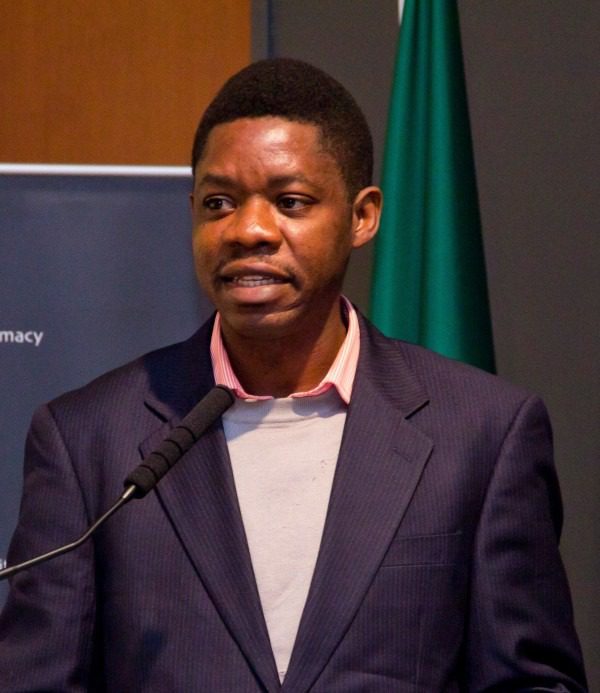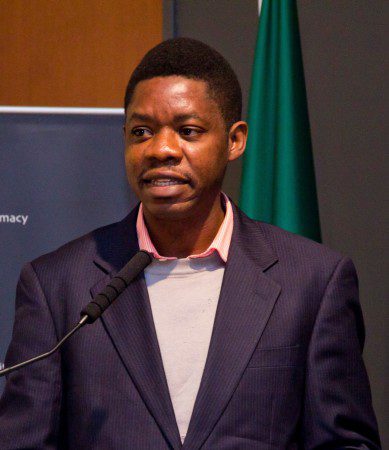Economic Issues
Economics As Politics By Other Means -By Simbo Olorunfemi


Simbo Olorunfemi
What is needed now is a deliberate move to steer the nation in a different direction. Investment and entrepreneurship has to be social in orientation. The kind of investors and entrepreneurs Nigeria need, now, are those propelled to disrupt the status quo to bring about social change. Rolling out the carpet for every Tom with hot money in his portfolio to come in and trigger dislocation, only to exit the morning after, is not sustainable. By now, it must be obvious that most of those ‘investors’ who come to play the capital market and buy treasury bills, are as fair-weather in nature, as they can only be.
The 2015 election was not just a political contest between two dominant political parties. It was also a wrestling bout between two socio-economic philosophies – one nestled on the right of the divide, the other tending towards the left. While one spoke up for individualism, the other extolled collectivism. Those who were in charge of the economy threw at us data touting growth, even where there was little on the ground to show for it. Poverty stared at their statistics in the face, yet they did not blink. Rather, it was all about celebrating an economic growth, while the people groaned. Theirs was an economic argument for a mushrooming of private jets while the commercial aviation sector struggled to fly. Soon, we were to have the official imprimatur of President Jonathan on the philosophy that glorified the primitive acquisition of private jets as an indication of economic growth in which a few prospered and the majority wallowed in poverty.
With collective poverty locked in an unholy embrace with selective prosperity, the other party, itself a subscriber to the ‘progressive school of thought’, had little choice but take ownership of the populist argument for a people-centred and welfare-oriented philosophy of socio-economic management. The argument on the street was for a system that embraces the bottom-up approach to economic development and not the trickle-down system that had been rammed down our throats by those who were more interested in producing billionaires from influence peddling and commoditisation of the commonwealth for retail to a select few. That system was more interested in a rigorous pursuit of removal of subsidy on petroleum products, while refusing to attend to the wilful neglect of local refining, corruption in the subsidy claims process, the obscene theft of crude oil, apart from the opaque and brazen robbery in the management process of the national oil corporation.
You would think that should it be established that petroleum products were indeed being subsidised, that such an action would itself constitute an economic crime. An economic team that had no reservations bailing out banks, after they had been robbed blind by ‘owners’ and their ‘debtor-friends’, develops cold feet when it comes to bailing out the poor. An economic manager that had no issue with rolling out intervention funds for the aviation sector which some rogue operators took advantage of, and putting together a forbearance package for stockbrokers, some of who rigged the capital market and left petty investors empty-handed, rises up in arms against a so-claimed subsidy of petroleum products, whose prices directly impact the lives of those at the bottom of the pyramid, who enjoy no form of protection. What that tells you is that, stripped of all forms of pretence, the economic programme pursued was political – framed to maintain the status quo of dominance of the majority by the few. One with a philosophical construct, with deadened conscience, fabricated to see the world through the eyes of individualism, as opposed to collectivism which better represents our socio-cultural context.
So when the other party (now in government) proposed to pay unemployment benefit, provide feeding for children in school and execute other people-oriented programmes, it represented a paradigm shift and an embrace of a different mind-set. Such thinking might not make sense to the arm-chair, textbook economists raised on crude market economics, but it does resonate with the expectations of the majority of Nigerians who have been victims of years of oppression and neglect. It was on the basis of this expectation and an embrace of this philosophy that people voted during the 2015 election.
Apostles of an unhinged, free market economics will rather us put One billion Naira credit in the hands of one individual, trusting that logic will push him not only in the direction of investing for profit, but one that will have a positive trickle-down effect on the economy. Common sense, however, tells some of us to split that One billion Naira into the hands of 10,000 women, with each receiving 100,000 Naira to fund micro-enterprises which will improve the quality of life of her family, impact her immediate economy, with the added benefit of return of a greater percentage of the capital invested, with risk spread over 10,000 individuals.
The 2015 election was a contest between free market and common sense economics. It is important not to forget which argument won at the polls. It is sheer laziness to simply dismiss social intervention programmes and subsidy as drain on the purse without considering potential benefits and the value chain triggered and kept active by a properly-directed subsidy programme and safety-net measures. The election was a referendum on the economic direction – a need for prudence, probity and accountability received overwhelming support over the laissez-faire approach to governance of yesterday. Those who lost at the polls should not be allowed to surreptitiously foist an economic philosophy roundly rejected.
The government has not been elected to pander to the whims and caprices of JP Morgan and gamblers who come into the country with hot money. Some have argued against the idea of the Treasury Single Account (TSA) on the jaded argument that running a transparent and accountable system will negatively impact the over-pampered banking sector. The question is – when did commercial banks become bankers to the government? Is it healthy for our banks to anchor their survival on a template based on public treasury? Our banks have, over the years, refused to engage with the real sector, comfortable with lending to government its own funds, at rates that defy logic, in the name of bonds and treasury bills. Perhaps, the banks will finally find a way into getting back to real banking. The era of unexplained funds driving up prices in the property market and other sectors, is grinding to a halt.
Those hiding behind JP Morgan and questionable indices to query the drive for accountability as a stepping stone for building a new structure know that it is beyond that. The usual suspects are mouthing a lack of direction, throwing at us data and projections that portend danger. We know. We know that the challenges are real- national income is projected to drop by as much as 30 billion dollars this year alone, as a result of drop in oil price. Goldman Sachs projects oil price could drop to as low as 20 dollars a barrel.
What is needed now is a deliberate move to steer the nation in a different direction. Investment and entrepreneurship has to be social in orientation. The kind of investors and entrepreneurs Nigeria need, now, are those propelled to disrupt the status quo to bring about social change. Rolling out the carpet for every Tom with hot money in his portfolio to come in and trigger dislocation, only to exit the morning after, is not sustainable. By now, it must be obvious that most of those ‘investors’ who come to play the capital market and buy treasury bills, are as fair-weather in nature, as they can only be. Query their activities and the JP Morgans of the world begin to breathe down your neck. These fly-by-night fellows are no investors. Time for Nigeria to stand her ground against forces seeking to play politics by other means.
Simbo Olorunfemi works for a Communications Consultancy.

















